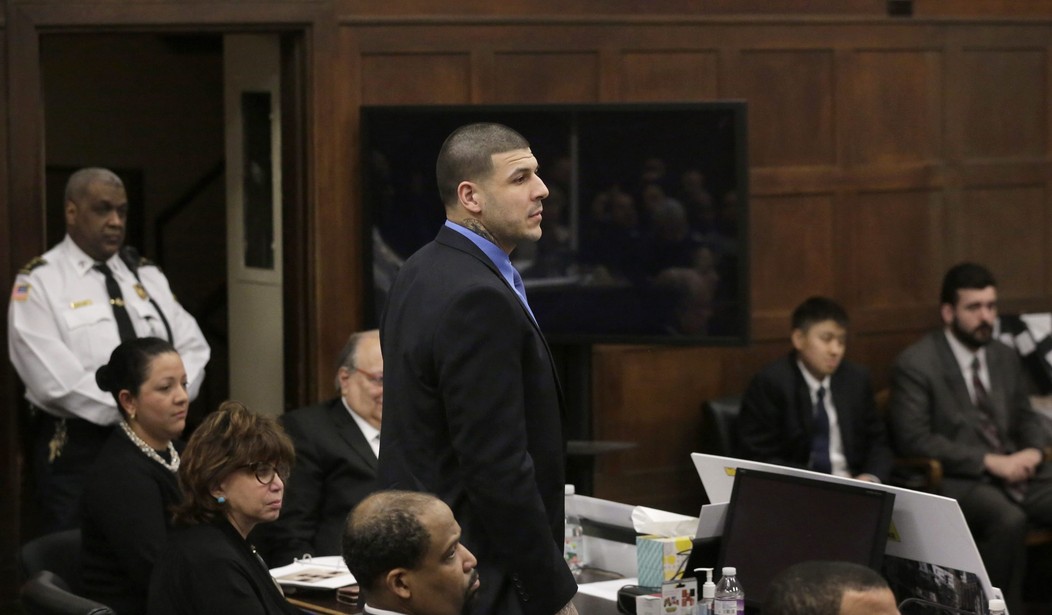Thanks to his jailhouse suicide, former New England Patriot Aaron Hernandez was laid to rest as an innocent man in the eyes of the law, even though he had been convicted of murder.
Hernandez killed himself in April before an appeal of his case was finished. So under Massachusetts law, and the legal principle known as abatement ab initio (meaning “from the beginning”), a judge ruled Hernandez’s murder conviction had to be overturned.
Two Massachusetts Democrats want to make sure that never happens again.
Hernandez was sentenced to life in prison without parole for the first-degree murder of his fiancee’s sister’s boyfriend, Odin Lloyd. Hernandez’s lawyer admitted his client was at the homicide scene in 2013. But, attorney James Sultan portrayed Hernandez as a 23-year-old who didn’t know how to handle the situation.
State Rep. Evandro Carvalho (D), a former prosecutor, spoke to Ursula Ward, the mother of Odin Lloyd, and decided to offer a proposal to restrict the use of abatement ab initio in Massachusetts.
Carvalho and Sen. Richard Ross have sponsored legislation, “An Act Relative to Odin Lloyd,” that would nullify abatement ab initio when the defendant dies by suicide before the completion of an appeal.
“Though tragedy struck both families involved in the events of Hernandez’s suicide and conviction, the lack of justice served to Odin Lloyd and his family can never be reversed,” said Ross. “This legislation will protect families in similar circumstances so that justice is maintained regardless of the defendant’s appeal status at the time of his/her suicide.”
While the legislative process moves forward, Bristol District Attorney Thomas M. Quinn III is more concerned with the use of abatement ab initio in the Hernandez case. Quinn has appealed the ruling that vacated Hernandez’s conviction to the Massachusetts Supreme Judicial Court.
“He died a guilty man and a convicted murderer. This fact is indisputable,” Quinn told reporters after Judge E. Susan Garsh threw out Hernandez’s first-degree murder conviction following the football star’s suicide.
“You can’t just snap your fingers and have that go away,” Quinn said.
Prosecutors argued Garsh should not dismiss the conviction because Hernandez knew a judge would have to erase the guilty verdict if he killed himself. However, Garsh said Massachusetts law and abatement ab initio left her no choice.
“This court cannot know why Hernandez may have chosen to end his life and declines to infer an intent by Hernandez to relinquish his appellate rights or an intent to interfere with the course of justice from his reported suicide, a tragic act that may have complex and myriad causes,” Garsh said.
In his appeal, filed June 23, Quinn called abatement ab initio an “archaic rule not based on the Constitution.”
“A defendant who commits suicide should not be able to manipulate the outcome of his post-conviction proceedings to achieve in death what he would not be able to achieve in life,” Quinn said.
Aaron Hernandez was not the first well-known defendant to have been found not guilty because of death thanks to the state’s legal principle.
Former Enron CEO Ken Lay’s multiple convictions were erased when he died before sentencing in 2006. Hernandez is also not the first convicted killer in Massachusetts to benefit by abatement ab initio.
The convictions of John Salvi, found guilty of killing two women in abortion clinics in Brookline, Mass., was also erased because, like Hernandez, he killed himself in prison while an appeal was pending.
The Daily Free Press, billed as the independent student newspaper at Boston University, editorialized that even though the concept of abatement ab initio was “frustrating in the Hernandez case,” it was “necessary.”
“If we’re allowing previously convicted criminals to enter the appeals process, including Hernandez, it would be wrong to ignore that upon their death,” the Daily Free Press opined. “Abatement ab initio may be an archaic law that relatively few states still follow, but its existence is often useful. It shows that this country takes the appeals process seriously and gives all people a second chance.”
However, MassLive.com published an editorial that argued using abatement ab initio in the Hernandez case “defies logic and justice” because a murder, investigation, trial and conviction did occur.
“Pretending otherwise ‘in the eyes of the law’ explains why so many people no longer have faith in the law as a fair and just arbiter of American society. There is room to respect the tragic circumstances of Hernandez’ life and death, and to feel compassion for the grief and sorrow of the family, without ignoring the truth of his ill-fated life,” the editorial read.
“Citizens don’t want legalese to take the place of basic, obvious fairness and common sense,” the editorial concluded, “and they wonder if, too often, it does.”









Join the conversation as a VIP Member